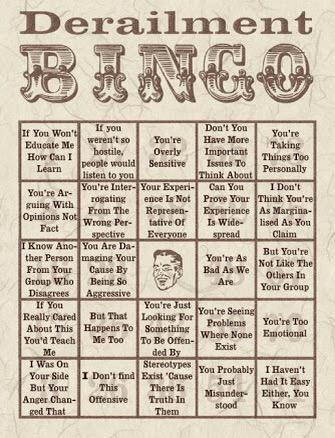 I am very lucky. I’m surrounded by amazing, fierce, articulate people who aren’t afraid to misbehave in the quest to fight for their own rights to exist as they are and as they choose. A majority of those people are women. It makes sense to me that the people most passionate about issues of equality, liberation, self-determination and more are the people still fighting to obtain those things. The Internet is one big megaphone and people who spend their entire lives under the lens of their opinions not mattering all of a sudden find their opinions make a difference.
I am very lucky. I’m surrounded by amazing, fierce, articulate people who aren’t afraid to misbehave in the quest to fight for their own rights to exist as they are and as they choose. A majority of those people are women. It makes sense to me that the people most passionate about issues of equality, liberation, self-determination and more are the people still fighting to obtain those things. The Internet is one big megaphone and people who spend their entire lives under the lens of their opinions not mattering all of a sudden find their opinions make a difference.
Women speak up. They do so loudly. They magnify the message. People listen.
I need to digress a few moments.
I know I’ve been out and loud, quite a bit over the last week. I’m usually not. I like to straddle the line between education and entertainment because I want to speak to everyone but still be real about it. This isn’t an academic thing for me. This is my life and this is what I enjoy, but sometimes I have to step out of the comfortable space I created for myself.
I’ve been listening to a podcast called This Week in Blackness for about a year and a half and it’s been fucking great. It’s often hilarious and heartbreaking at the same time. Listening to Elon James White, Imani Gandy, Dara Wilson and Aaron Rand Freeman’s focus on issues affecting the black community, blackness in general, and how a lot of oppression is intersectional has helped me focus my own attention, given me insight in some places and spaces I didn’t intrinsically understand, and given me the tools to communicate with people in ways I haven’t always been able to. I just flat out understand and better respect opposing voices more due to their collective insight.
It’s given me the ability to understand Victoria A Brownworth’s article about Everyday Mansplaining: Can Men Really Be Feminist Allies better because even though I understood the message and acted on it, I didn’t feel it. I now, after re-reading it better understand awkward and/or creepy men and how they’re shaped and corralled into relating to the world how they do. It made me finally really get why they lash out at being #friendzoned or when they don’t get what they feel they’re owed. It made reading Jessica Roy’s article Is There Any Right Way to Reject a Guy about how Grace Spelman was harassed incessantly by an “ally” both heartbreaking and recognizable.
To address the tiny elephant in the room, it also meant I understood the thought process behind the harassment I’ve been publicly calling out over the last few days. I wished desperately I could find something that’d pop a lightbulb and get the cycle to stop so we could figure this out and at the end of the day accept apologies and continue going forward. It hasn’t happened, but it doesn’t mean I won’t continue to look for an opportunity.
When women speak up, there is often disagreement about the construction or tone of the message, or about the messenger, or about the delivery platform, or about the minutiae. Sometimes academic arguments about tradition or history pop up. Maybe it’s too soon or people worry the message won’t be well received. Some allies express worry that taking extreme measures will turn off supporters and make it harder to pursue the goal we all want.
That disagreement is usually pretty healthy; sometimes it turns into a fight club for ideas, sometimes it’s a respectful deliberative academic discussion, but they’re there and they get worked out often right in the open. At the end of the day, someone decides to stand up and take action or take the microphone and speak and all those arguments take a back seat to what just happened, and we move forward.
Much like the people I’m surrounded by, many of the spaces these ideas get tossed around in are either majority women’s spaces or acknowledged as safe spaces because again, much of this is all about righting the historical and structural wrongs that make it immensely more difficult for women to build lives professionally on par with men, or to walk about the world free of objectification and harassment and to simply be safe. It’s about women first and foremost.
As a man in this space, my contribution is valuable. I can help turn systemic oppression of women on its head, I can express ideas to people, mostly men, who otherwise wouldn’t listen to those ideas from women. As a male messenger, I can bridge some of the gaps in understanding and in life experience for people who don’t know what it’s like to live the life of someone who has to fight tooth and nail for the same things that I occasionally take for granted. I can provide real material support to people doing seriously good work.
This is how I try to be an ally.
Sexism, mansplain, and the patriarchy and all the jazzy “buzzwords” thrown around are real descriptors of women’s real oppression. In fact, these phenomena affect us all. It particularly affects and suppresses women and their voices. This is their fight. It’s their movement. And while I can and choose to be a part of that it doesn’t necessarily mean my voice is more valuable than anyone else’s because I’m doing something I don’t have to do.
It means I accept a junior role in the fight and I have to be ok with it.
I absolutely still express my opinion on message, on tone, on strategy, on action, but it’s up to me to do a lot more listening than talking. When someone does stand up and take action, I throw them my support because standing up and taking action that’s going to make people think, that’s going to piss people off, that’s going to be controversial will make them a target for the people who, by definition of people they disagree with, are going to end up losing some of their control over other peoples’ lives.
Life isn’t a zero-sum game but the people who have and want to maintain their power treat it that way, so they fight tooth and nail to maintain what they have and, unfortunately, the world can seem like a frightening place.
Sometimes men, sometimes allies in the movement, get sucked in by that zero-sum logic.
Men, particularly white, heterosexual, cisgender men are used to having their opinions respected and acknowledged. Being told their thoughts on feminism, equality, sex-positivity or anything else are heard but disagreed with hits in a sore spot. Sometimes they fight tooth and nail to convince people that their way really is the best way because they know how people will receive these actions and arguments. Sometimes they don’t give up and they start acting like stereotypical men telling women to shut up because they know better. They mansplain oppression and sexism as if the people around them don’t understand. These men become jerks, harassers, assholes to assert and attempt to hold on to all the power. In doing so, they clog up the cogs of progress and legitimate discussion with respectability pleas and cries for acknowledgement. Sometimes even with the best intention to start these men can’t willingly hear that in regard to women’s oppression and experiences, women just don’t give a fuck what you think.
Get over it.
That is what it takes to be a true ally.
If you hear women complaining about how terrible men and you feel insulted, you probably have something you’re guilty of feeling or doing. That is your work, not theirs. By inserting your emotional fragility into their experience, you are not helping, you are not being an ally. It is your job to remember, they’re not complaining about you, they’re complaining about those men.
You want to be an ally? You can and must get over it.
If you’re reading this you likely already know how good it can be when people move in life as equals. It’s a scary world, a world where a white dude’s opinion doesn’t carry any more weight than anyone else’s or even where, heavens to betsy, it’s less valuable when in someone else’s space.
But if you’re a guy surrounded by women you’re trying to help, if you can’t bear the feeling that no one cares about what you think, shut the hell up and deal with it on your own time. Women just won’t care as much about what you think about feminism or allyship or sexual dynamics or anything. Don’t keep pushing and prodding, don’t keep getting in peoples’ faces. You have the right to express yourself just like anyone else, but those anyone elses have the right to ignore you by not giving a fuck. Those anyone elses are fighting their own good fight. Either be an ally, or step back until you can.
No one has to give a fuck about what you think,
like no one has to give a fuck about what I think.
Let's deal with it and move on.


5 Comments
I have, perhaps unfairly, grown accustomed to being a penis-owner who gets passes in woman-space because I’m gay. Should I feel guilty?
No.
I was going to write more but everything I kept writing kept coming back to no.
Thanks for this post, Dylan. Really interesting and well thought-out. My husband and I were just talking about this after he called out someone on facebook for sexist microaggressions. Often those ‘in power’ (usually straight men) will only listen to those who have nothing to gain by standing up and speaking (usually other straight men).
Thanks for being an awesome ally!
I’m so glad I styled across you on Twitter to find this. This really resonates with me as an egalitarian. I’ve somewhat recently started identifying as an ally to the #BlackLivesMatter campaign. As a white woman in solidarity with that cause, your words are completely applicable to my role as an ally as well. It’s not about me. What I have to say doesn’t matter nearly as much as what they have to say. I’m just an ally. I will have a post up soon on my blog about participating in the Jonathan Ferrell #BlackLivesMatter protest in Charlotte,NC last month. I’d love for you to read it when it’s up and share some insight as your experience with being a feminist ally would relate it.
By the way, totally sharing this across my social media.
I’d love to read it, send it my way when you put it up!
It’s strange… I move around in the world as a white person quite a bit, I’m a light skinned latino so only when i grow a mustache or spend significant periods of time in the sun do I really “look my race” so… #BlackLivesMatter resonates with me hard but I find myself feeling like I am more of an ally, trying to do what I can instead of really being “in it” just because of how I walk through life.
I’m ok with that.
It also means it’s a little easier to talk to white people about it since I look like one of them and I naturally try to bridge gaps in understanding so…. it works out. 🙂